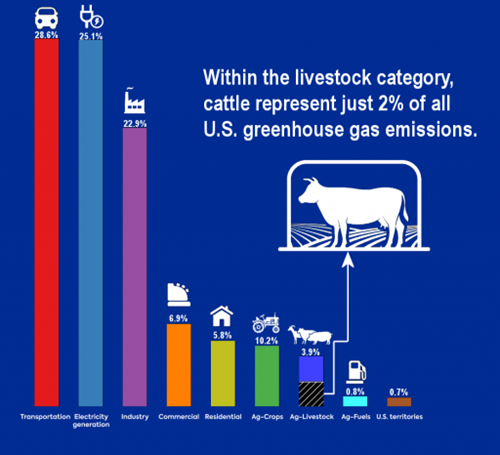SOURCE:
An article in The Epoch Times describes recent efforts in Australia and globally to target farmers and reduce methane emissions from cattle and other domestic livestock to fight climate change.
The Epoch Times article accurately notes that feral animals create the bulk of methane emissions, and targeting methane emissions from agriculture will have little or no impact on climate change.
The article, “Pledge to Cut Methane Fails to Include World’s Largest Feral Populations: Regional Australian MP,” contains statements from Keith Pitt, an Australian Member of Parliament (MP), who says his government’s regulations on livestock-related methane emissions represent an “underhanded attack” on agriculture.
“Moves to cut methane gas emissions from domestic livestock, like cows and pigs, fails to take into account the sheer volume of feral animals now populating countries like Australia, one MP has said,” writes The Epoch Times.
Australia has massive feral animal population.
“The country is estimated to contain 400,000 wild horses, five million donkeys, 150,000 water buffalo, one million camels, and 24 million feral pigs—in comparison, the United States contains just six million feral pigs,” writes The Epoch Times.
In addition, Australia and New Zealand both have large populations of feral goats, and New Zealand has feral sheep. All of these animals emit methane, yet, none of them are targeted as a threat to the climate. By comparison, the Australian and New Zealand governments are each considering legislation to limit methane emissions from livestock. According to The Epoch Times, New Zealand is considering a imposing a tax on farmers, charging them between $15,000 and $50,000 per year for having methane-producing animals.
Climate alarmists’ attacks on agriculture are not limited to Australia and New Zealand, however. As discussed in the Climate Realism post “Climate Activists Launch New Assault on Agriculture, Petition EPA for Hog and Dairy Restrictions,” 25 activist groups petitioned the U.S. Environmental Protection Agency (EPA) to restrict the number of pigs and dairy cows farmers can have, citing methane as a “climate super pollutant.” This would be a regulatory measure similar to those being considered by Australia, New Zealand, and several European countries.
Yet, the evidence suggests that restrictions on farmers would be in vain, because data indicates the methane cattle, sheep, and other livestock emit into the atmosphere has, at best, a relatively small, short-term effect on global temperatures.
Research shows the contribution to atmospheric methane by ruminants (grazing mammals like cows, sheep, etc.) has been greatly exaggerated. Research from Prof. Habil Wilhelm Windisch, Ph.D., of the Technical University of Munich, indicates, contrary to alarmist claims that ruminants contribute 20 percent of greenhouse gas emissions, in reality the contribution is closer to 5 percent. If Windisch’s research is correct, climate alarmists exaggerate the contribution of domestic livestock from methane emission by a factor of “3 to 4,” at a minimum.
Windisch’s research is seemingly confirmed from official government data for the United States. Climate at a Glance: Livestock and Methane provides data on livestock emissions for the United States from the U.S. EPA. It shows that beef cattle account for 2 percent of United States greenhouse gas emissions, and livestock as a whole account for less than 4 percent. (See figure below)

Additionally, methane plays a very minor role in the atmosphere’s energy absorption spectrum, with narrow absorption bands that occur at wavelengths which are already being covered by the most potent atmospheric greenhouse gas—water vapor. On top of that, methane is also a relatively short-lived atmospheric gas, with an atmospheric lifespan of around 12 years. Methane is what is known as a “flow gas” or a gas that is destroyed at roughly the same rate of emission. These factors combine to make methane a practically irrelevant atmospheric gas when it comes to supposed human-caused global warming.
Because data does not support the idea that livestock-originating emissions pose a climate threat, the proposed taxes on farmers and ranchers are arguably unjustified and underhanded, as The Epoch Times and Australian MP Keith Pitt state. Government action against the food supply will not have any impact on the climate, but will increase the price of food, and advance starvation and malnutrition.